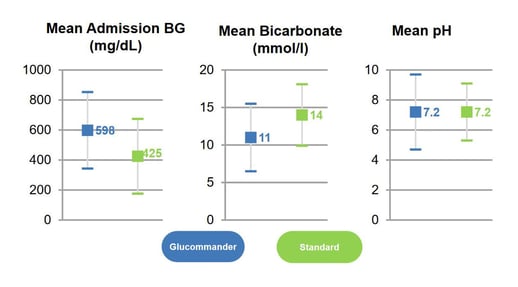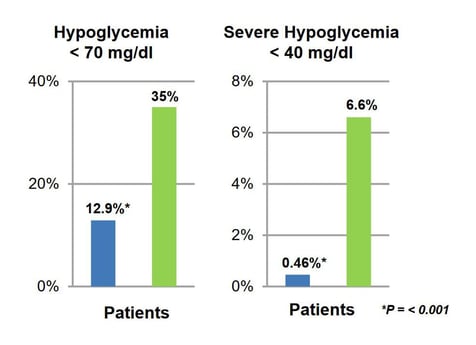Comparison of Computer-Guided Versus Standard Insulin Infusion Regimens in Patients with Diabetic Ketoacidosis
Presentation
American Association of Clinical Endocrinologists Scientific & Clinical Congress
Date
May 2016
Authors
Joseph Aloi,1 Harry Hebblewhite,2 Robby Booth,2 Bruce Bode,3 Raymie McFarland,2 David Reyes,4 Amy Henderson,2 Francisco Pasquel,4 Jagdeesh Ullal,5 Guillermo Umpierrez4
Background
Continuous insulin infusion (CII) is widely accepted as the standard of care for the treatment of patients with diabetic ketoacidosis (DKA). A variety of standard (paper form-based) and computer-based algorithms have been shown to be effective in the management of hyperglycemia in critically ill patients. It is not known, however, if computer-based algorithms are superior to standard protocols in the management of patients with DKA.
Methods
Accordingly, this retrospective multicenter study was conducted, comprised of 2,665 patients with DKA treated with either a computer-guided program (Glucommander, n = 1750) or standard protocols (n = 915) in 34 medical institutions in the US. Assessments were made for differences in time to resolve hyperglycemia (<200 mg/dL), acidosis (HCO3 >18 mmol/L), and number of hypoglycemic events (BG <70 mg/dL and <40 mg/dL).
Results
The results of the outcome parameters between the two groups are outlined in the table and graphs.
| Metric | Glucommander | Standard | P-values |
|---|---|---|---|
| Median Time BG <200 mg/dL | 9.15 hours | 10.97 hours | <0.001 |
| Median Time Bicarbonate >18 mmol/L | 13.6 hours | 17.3 hours | <0.001 |
| Median Length of Hospital Stay | 3.2 days | 4.5 days | <0.001 |
Conclusion
In conclusion, the use of Glucommander as a component of DKA management is associated with significantly less hypoglycemia, faster time to normalization of blood glucose (<200 mg/dl) and bicarbonate (>18 mmol/L) than standard orders for treatment of DKA. There was also a significant difference in LOS for patients treated with Glucommander than standard orders (4.5 vs 3.2 days). Prospective randomized clinical trials comparing the efficacy and cost of computer-based algorithms versus standard CII regimens are warranted.
Affiliations
- Wake Forest Medical Center, Winston Salem, North Carolina.
- Glytec, Waltham, Massachusetts.
- Atlanta Diabetes Associates, Atlanta, Georgia.
- Emory University School of Medicine, Atlanta, Georgia.
- Eastern Virginia Medical School, Norfolk, Virginia.

